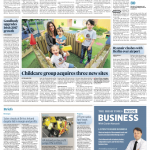Ireland Scores Highly For Regulation But Falls on Market Outcomes
28th May 2010
The 2010 ECTA Regulatory Scorecard, which gauges telecom regulation in 22 European countries, has ranked Ireland in sixth position for its regulatory landscape. However, despite this positive assessment, Ireland is failing to create an open market with Eircom still remaining the dominant telco. The pro-competition body’s annual regulatory Scorecard reveals that that the government and ComReg have tried a range of remedies to make the market more open to other operators but these have failed.
In light of this, released 28th May, ALTO’s chairman Ronan Lupton calls on ComReg to separate Eircom into retail and wholesale businesses, effectively meaning that Eircom would deal with alternative operators on an even level: “We are urging that the new EU communications framework be transposed into law immediately and that ComReg uses the power it grants to functionally separate Eircom.” said Ronan Lupton chairman of the Association of Licensed Telecoms Operators, Ireland’s member of ECTA.
The new EU communications reforms agreed last November by the Council of Telecoms ministers and the European Parliament will give greater powers and independence to regional regulators such as ComReg. The separation of BT in the UK resulted in a much more open market with the amount of unbundled lines growing from 100,000 to 5.5 million lines within three years.
Mobile Broadband usage in Ireland twice the European Average
The scorecard notes the high prevalence of mobile broadband in Ireland with the EU Commission revealing this week in its own report on the state of European telecoms markets that Ireland is using twice the European average of mobile broadband at 10.5% compared to the scorecard’s top performer, The Netherlands 1.5%. ALTO warns against allowing the Irish broadband market to become reliant on mobile as the technology offers internet speeds far lower than what is needed for business and even for next generation domestic use.
“Mobile is naturally cheaper as there is no incumbent monopoly in place but it is a poorer performing technology with ComReg revealing last week that the average user suffers speeds of only 607Kps to 1.69Mbps. By encouraging investment in faster fixed line technologies through better market conditions we can benefit from the network we need.” said Lupton
Investment in Infrastructure vital
The Scorecard found that the effectiveness of regulation still varies significantly across Europe and that the actions of the regulator have a strong influence on the development of high-speed broadband, a key objective of the EU 2020 Strategy.
The report also highlights how the competitiveness of multi-national European firms is being undermined by the variations in regulation, which push up the cost of building networks across Europe. “There is a direct correlation between creating an open telecoms market and investment in our communications infrastructure. If the government is serious about attracting FDI and encouraging indigenous technology enterprises they must move on Eircom’s monopoly.” added Lupton.





